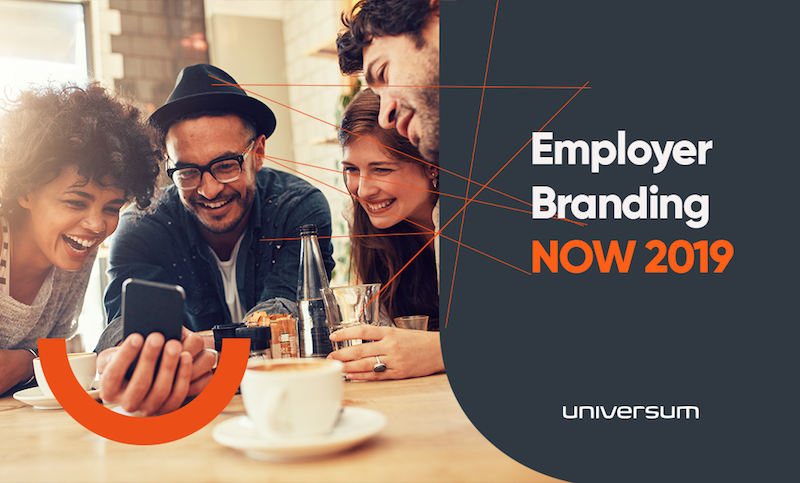No time to read the complete Employer Branding Now Report from Universum? Recruitment Marketing Magazine has you covered with this summary of key takeaways covering talent competition, AI and EVP trends.
Universum recently released their 2019 report, “Employer Branding Now”, which gathered insights from the World’s Most Attractive Employers (WMAEs), a cohort of the top 100 employers identified by job seekers.
The study involved analysing feedback from over 1600 employer branding professionals from 37 countries and 21 industries, including recruitment and resourcing professionals and HR, marketing, and talent and acquisition managers. Here we look at the top trends gaining traction in the recruitment sector.
Employer branding
With the increase in competition for top talent acquisition and fears that a talent gap will have negative impacts on business growth, employer branding is regarded as no longer just a ‘nice-to-have’ for organisations both large and small.
In fact, nine out of ten WMAE talent leaders say branding is one of the top priorities, and a study by LinkedIn’s Hiring Solutions Insights Team supports this notion. It concluded that companies that invest in their employer brand are much more likely to see a direct impact on their talent acquisition efforts.
However, brand consistency does not necessarily mean brand uniformity. While many WMAE companies once placed greater focus on consistency overall, now more than half put greater emphasis on tailoring their marketing strategies to different functions and to different countries.
In terms of employee-generated content, Universum’s report also shows there is a trend towards producing visual content on platforms like Facebook, Snapchat and Instagram (the fastest growing), followed by testimonials.
Despite all the hype about the value of digital transformation in this technology-centric age, data-driven approaches, in comparison, have been slow to progress. Although many organisations have access to valuable, targeted data that can attract top talent, many don’t leverage it effectively.
“A degree of brand consistency is always important, but effective engagement with the talent we want to attract also requires us to tailor content to the specific needs and interests of different target groups”. Faye Woodhead, Global Head of Employer Brand & Graduate Programmes, Deutsche Bank
Startup competition
Large companies and iconic brands are increasingly seeing recruitment startups as a major source of competition for top (and young) talent in terms of the key technical and entrepreneurial skills many organisations require.
Manpower’s 2018 Talent Shortage survey confirms this finding – they report that over 67% of larger organisations are reporting difficulty with filling roles. This is particularly prevalent in the IT sector – a report from the International Data Federation estimates that over 30% of global IT jobs will be left open by 2022, as employers compete for candidates with specific digital skills in the areas of AI, blockchain and the Internet of Things.
According to a 2019 PwC CEO Survey, an increase in competition can also have serious consequences for CEOs who fear the talent gap won’t allow them to innovate effectively or reach their growth targets. This has caused a shift in employer brand strategy over the last three years, including an emphasis on ‘innovation’ as a key Employee Value Proposition (EVP) attribute.
Large companies are now focusing on attracting talent who are more inclined to embrace the high-energy, less formal work styles of startups by adapting more quickly to market conditions and by fostering their most favourable qualities. They do this by creating ‘accelerators’ teams designed to boost an organisation’s culture, management techniques and digital capabilities.
“If you were a young, tech-savvy, entrepreneurially minded student right now, would you prefer to join the bottom-rung of the corporate ladder or prefer the adventurous, hyper-growth promise of the start-up sector? I think the answer is fairly obvious, and that’s the primary challenge for the previously go-to, prestigious, global companies right now, since this is precisely the kind of talent they’re looking for.” Richard Mosley
Global Head of Strategy and Advisory, Universum.
Employee Value Proposition
Over 54% of talent leaders cite ‘inspiring purpose’ as the most common Employee Value Proposition (EVP) of 2019, as opposed to traditional job benefits like ‘professional training and development’. This is not surprising given that Gen Z and Millennials are increasingly seeking jobs that are ‘meaningful’ and ‘make a difference to the world’.
Younger talent is also less focused on long-term career development with the one company, but instead looking for more flexible, unstructured career journeys. Employer branding that reflects these trends therefore has an impact – a recent LinkedIn study found younger workers under 40 are over 60% more likely to have their job consideration levels associated with a progressive employer brand.
For WMAEs, 37% of respondents also cited recruiting for diversity as a key Employee Value Proposition (EVP) theme. This focus is due partly to a growing body of data relating to pay inequity, a lack of diversity in corporate leadership roles, and growing evidence that suggests that recruiting for diversity delivers stronger results. This is evident in management consulting firm McKinsey’s “Delivering Through Diversity” study that found having gender/ethnically diverse executive teams positively correlated to higher profitability.
Many companies are also adhering to the notion that in order to support their employer brand, employees must see the organisation as a ‘great place to work’. In 2019, 48% of WMAE brands believe one of their primary employer brand objectives should be enhancing employee advocacy.
“At Adidas, we believe that sport has the power to change lives. We put this purpose at the heart of our EVP and it has continued to provide a strong emotional foundation to our employer brand and the kind of stories we tell to bring our brand to life”. Nanci Hogenboom, Global Director of Employer Branding, Adidas
Artificial intelligence
Perhaps one of the biggest recruitment marketing game changers for companies in 2019 has been in the area of artificial intelligence (AI).
It is vital that large global companies that operate in multiple countries across different departments can predict workforce needs – a difficult task given the number of variables involved. AI has the potential to revolutionise how organisations optimize their employee pool across both locations and skillsets. For example, LinkedIn’s new AI offering helps subscribers detect how competitive certain geographic markets are for specific tech roles.
When it comes to candidate searching and selection, video interviewing is still widely used, however according to the WMAEs, the most popular form of AI-driven technology is now chatbots.
This data-driven technology has the potential to analyse users’ needs and qualifications, propose jobs that match their abilities and if they are interested in a particular job, chat anonymously with a virtual employer to learn more. These technologies can also help employers efficiently sort through applicants’ resumes by providing insights that can guide decision making, and narrow the pool of candidates so they can make a suitable offer.
The challenge ahead
The future challenges for recruiters are far bigger than just HR issues. To become talent leaders, companies must build strong cultures, implement well-crafted EVP’s, and invest in new technologies.
As Universum’s Global Head of Strategy and Advisory, Richard Mosley, says, “Whatever the size of your organisation, the fundamentals remain the same. Employers need to stay in tune with the talent they need to succeed, define and communicate a clear and distinctive employer proposition, and deliver an employment experience that consistently matches their brand promises. These factors … make for an exciting period ahead for those willing to rise to the challenge”.
Source:
Universum’s Employer Branding Now Report 2019

With a career history of over 20 years in the marketing sector working for some of Australia’s top ad agencies, Kaye launched her own copywriting business, KK Productions, in 2014.
Her client list includes Australia’s largest retail travel outlet, the world’s largest insurance company and one of the country’s top retail stores; she has also written content for a variety of other sectors from recruitment, real estate and educational organisations to health and service-oriented industries. Kaye’s writing experience spans the full gamut of advertising and marketing copy. When she is not immersed in the world of writing, she loves reading, travel and bushwalking with her husband and dog, Barney.

